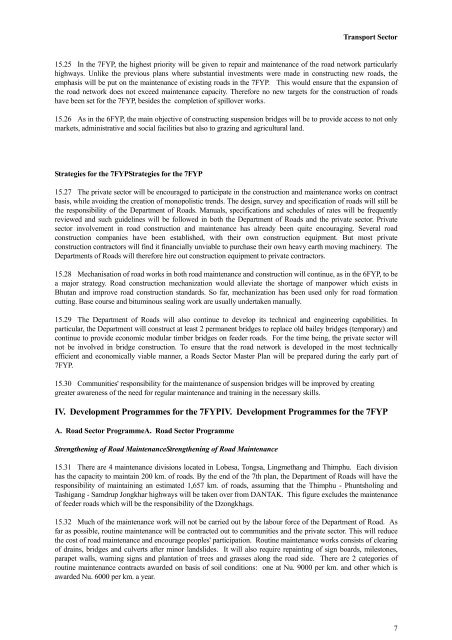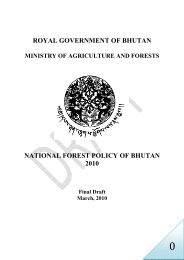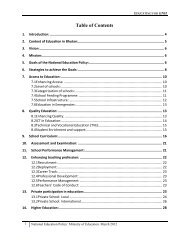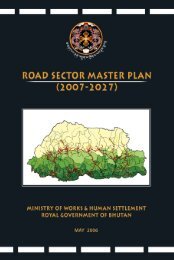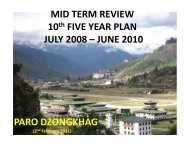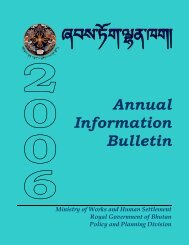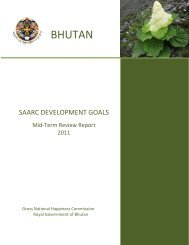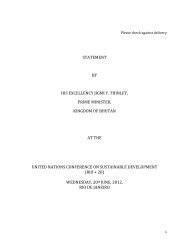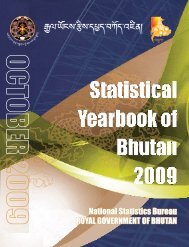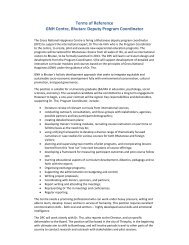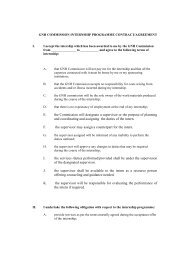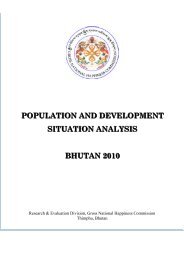COUNTRY BACKGROUND - Gross National Happiness Commission
COUNTRY BACKGROUND - Gross National Happiness Commission
COUNTRY BACKGROUND - Gross National Happiness Commission
Create successful ePaper yourself
Turn your PDF publications into a flip-book with our unique Google optimized e-Paper software.
Transport Sector<br />
15.25 In the 7FYP, the highest priority will be given to repair and maintenance of the road network particularly<br />
highways. Unlike the previous plans where substantial investments were made in constructing new roads, the<br />
emphasis will be put on the maintenance of existing roads in the 7FYP. This would ensure that the expansion of<br />
the road network does not exceed maintenance capacity. Therefore no new targets for the construction of roads<br />
have been set for the 7FYP, besides the completion of spillover works.<br />
15.26 As in the 6FYP, the main objective of constructing suspension bridges will be to provide access to not only<br />
markets, administrative and social facilities but also to grazing and agricultural land.<br />
Strategies for the 7FYPStrategies for the 7FYP<br />
15.27 The private sector will be encouraged to participate in the construction and maintenance works on contract<br />
basis, while avoiding the creation of monopolistic trends. The design, survey and specification of roads will still be<br />
the responsibility of the Department of Roads. Manuals, specifications and schedules of rates will be frequently<br />
reviewed and such guidelines will be followed in both the Department of Roads and the private sector. Private<br />
sector involvement in road construction and maintenance has already been quite encouraging. Several road<br />
construction companies have been established, with their own construction equipment. But most private<br />
construction contractors will find it financially unviable to purchase their own heavy earth moving machinery. The<br />
Departments of Roads will therefore hire out construction equipment to private contractors.<br />
15.28 Mechanisation of road works in both road maintenance and construction will continue, as in the 6FYP, to be<br />
a major strategy. Road construction mechanization would alleviate the shortage of manpower which exists in<br />
Bhutan and improve road construction standards. So far, mechanization has been used only for road formation<br />
cutting. Base course and bituminous sealing work are usually undertaken manually.<br />
15.29 The Department of Roads will also continue to develop its technical and engineering capabilities. In<br />
particular, the Department will construct at least 2 permanent bridges to replace old bailey bridges (temporary) and<br />
continue to provide economic modular timber bridges on feeder roads. For the time being, the private sector will<br />
not be involved in bridge construction. To ensure that the road network is developed in the most technically<br />
efficient and economically viable manner, a Roads Sector Master Plan will be prepared during the early part of<br />
7FYP.<br />
15.30 Communities' responsibility for the maintenance of suspension bridges will be improved by creating<br />
greater awareness of the need for regular maintenance and training in the necessary skills.<br />
IV. Development Programmes for the 7FYPIV. Development Programmes for the 7FYP<br />
A. Road Sector ProgrammeA. Road Sector Programme<br />
Strengthening of Road MaintenanceStrengthening of Road Maintenance<br />
15.31 There are 4 maintenance divisions located in Lobesa, Tongsa, Lingmethang and Thimphu. Each division<br />
has the capacity to maintain 200 km. of roads. By the end of the 7th plan, the Department of Roads will have the<br />
responsibility of maintaining an estimated 1,657 km. of roads, assuming that the Thimphu - Phuntsholing and<br />
Tashigang - Samdrup Jongkhar highways will be taken over from DANTAK. This figure excludes the maintenance<br />
of feeder roads which will be the responsibility of the Dzongkhags.<br />
15.32 Much of the maintenance work will not be carried out by the labour force of the Department of Road. As<br />
far as possible, routine maintenance will be contracted out to communities and the private sector. This will reduce<br />
the cost of road maintenance and encourage peoples' participation. Routine maintenance works consists of clearing<br />
of drains, bridges and culverts after minor landslides. It will also require repainting of sign boards, milestones,<br />
parapet walls, warning signs and plantation of trees and grasses along the road side. There are 2 categories of<br />
routine maintenance contracts awarded on basis of soil conditions: one at Nu. 9000 per km. and other which is<br />
awarded Nu. 6000 per km. a year.<br />
7


